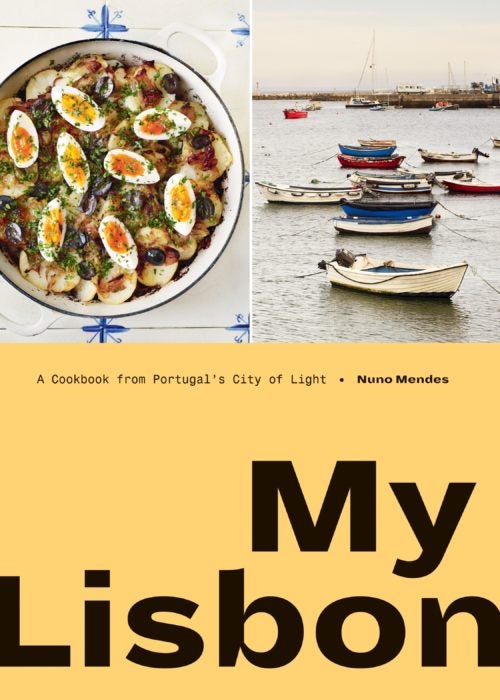













In My Lisbon, Nuno Mendes shares classic Portuguese recipes.
You’ll no doubt have heard of piri piri chicken, as it features on the menu of several international restaurant chains. Their reinvention of the dish has nothing on the real thing, which is spatchcocked and cooked slowly over charcoal, constantly basted with hot, fragrant butter. It originated in Mozambique, a former Portuguese colony, where the fiery piri piri or malagueta chiles were grown. If you cook it on a wood-fired grill, you might be transported to this far-away tropical place—but you can also roast it in the oven!
Freshly fried potato chips are eaten throughout Portugal as a snack, or to accompany sandwiches and rotisserie chicken. Traditionally, the chips are served salted, but there are many other flavoring options you can try. You can use salts, herbs, and chile oils to enhance your chips—the sky really is the limit in terms of the seasoning.
Directions
- Spatchcock the chicken, or ask your butcher to do it for you. This involves removing the backbone so that the chicken can be completely flattened out, ensuring even and quick cooking. Put the chicken breast-side down on a board, its legs facing toward you. With strong kitchen scissors, cut along both sides of the backbone from the tail to the head to remove it. Spread the chicken out and turn it over, then press down on the breastbone firmly until you have flattened it. Make a few diagonal slashes along the breast on each side. Season the skin generously with salt and pepper and chill for 2 hours. This draws out moisture for increased flavor and makes the skin crisper during cooking.
- To make the piri piri paste — Pound the garlic, chile, lemon, and olive oil with sea salt and white pepper in a mortar and pestle or purée them with an immersion blender or small food processor. Rub the paste all over the chicken skin and leave to marinate for another 2 hours, if you have time.
- To make the potato chips — Peel the potatoes and slice them as thinly as you can, using a mandoline. Rinse them under cold water to remove excess starch so that they don’t color too quickly when frying. Pat them dry with paper towels, then put the slices in a clean kitchen towel and carefully wring it out to squeeze out all the moisture. Fill a large, heavy-bottomed pan one-third full with oil and heat it to 310°F. Fry the potatoes in small batches for 3 to 5 minutes, or until cooked but still pale. Remove the chips with a slotted spoon and increase the oil temperature to 355°F. Fry the chips again briefly in batches until golden and crispy. (Do not overcrowd the pan, and take care that the oil temperature does not rise too high.) Use a slotted spoon to remove them from the pan and drain on paper towels, then sprinkle with salt and pepper and whatever flavorings you wish to use.
- To cook the chicken — Preheat the oven to 430°F (convection 390°F). Put the bay leaves on a baking sheet and place the chicken on top. Roast for 45 minutes to 1 hour, or until cooked through, basting regularly. Remove and transfer to a warm plate to rest for about 15 minutes. Pour all the cooking juices from the dish into a pan, including the lovely fat. Warm the juices, adding the butter and brandy. Simmer gently for 1 to 2 minutes, then remove from the heat and stir in the parsley. Pour over the chicken and serve immediately with the chips.
Reprinted with permission from My Lisbon copyright (c) 2018 by Nuno Mendes. Published by Ten Speed Press, an imprint of Penguin Random House LLC.

